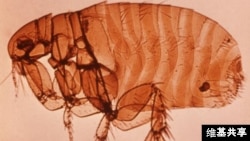A teenager from Oregon has been diagnosed with bubonic plague and is hospitalized in intensive care, according to state officials.
State and local public-health officials say the 16-year-old girl most likely was infected by a flea bite during a hunting trip earlier this month.
Bubonic plague is believed to be the source of the "Black Death," a pandemic that swept through Asia, Europe and Africa in the 14th century and killed up to 50 million people, according to modern estimates. The disease has never been eradicated, and the bacterium that infects humans lives on in the wild - most often in fleas but also in woodland rodents such as squirrels or chipmunks.
Plague is rare in humans, and is treatable with antibiotics if caught early, but federal authorities report there has been a puzzling increase in cases this year, for unknown reasons.
"Many people think of the plague as a disease of the past, but it's still very much present in our environment, particularly among wildlife,” said Emilio DeBess, a veterinarian who works for the state public health division in Oregon, which confirmed details of the current case. “Fortunately, plague remains a rare disease, but people need to take appropriate precautions with wildlife and their pets to keep it that way."
Anyone infected by bubonic plague generally develops symptoms such as chills, headache, weakness and a bloody or watery cough within a few days.
Oregon has only seen eight cases of bubonic plague since 1995, none of them fatal.
According to the Centers for Disease Control and Prevention, there were 1,006 cases of plague in the U.S. between 1900 and 2012. Eighty percent were victims of bubonic plague - one of three varieties of plague caused by the same bacterium, Yersinia pestis.





